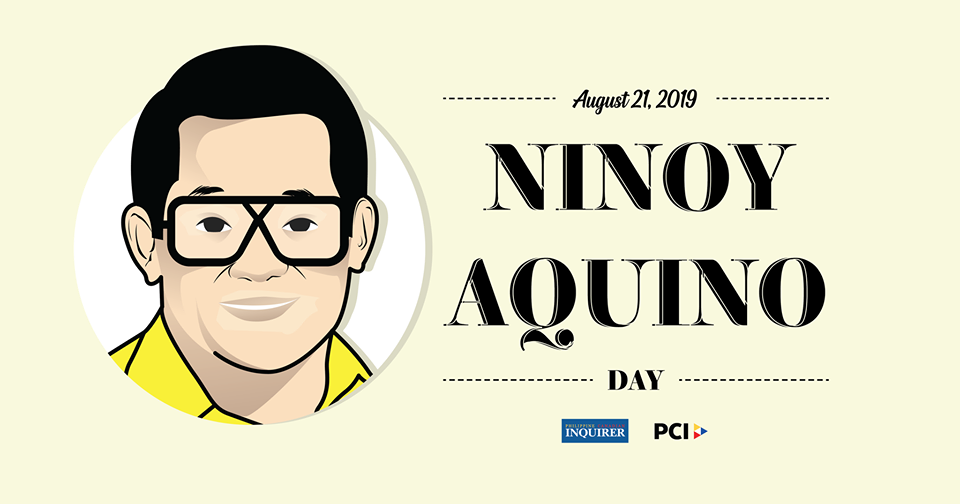
It is another holiday for the month of August and while Filipinos are celebrating for another day of rest from work, August 21 is a day to commemorate one of the icons of Philippine democracy.
Falling on a Wednesday for this year is the 36th death anniversary of former Senator Benigno “Ninoy” Aquino, Jr. Signed into law by former President Gloria Macapagal-Arroyo, Republic Act (RA) No. 2956 declares August 21 of every year as “Ninoy Aquino Day.”
But who exactly is Aquino for the Filipino nation to have a holiday dedicated for him?
The man with iconic square glasses
Born on November 27, 1932, in Tarlac province, the iconic man was the son of a Filipino politician, Benigno Aquino, Sr., and grandson of General Servillano Aquino, a famed revolutionary.
Aquino, an average student as what his biographies tell about him, took his secondary education at San Beda College and his tertiary education at Ateneo de Manila University to obtain a Bachelor of Arts degree but he stopped. At the age of 17, he became the youngest reporter to cover the Korean War for The Manila Times, that led him to receive the Philippine Legion of Honor award from President Elpidio Quirino at 18. Aquino studied law at the University of the Philippines where he became a member of Upsilon Sigma Phi, however, he halted his studies again to pursue his journalism career.
He was only 22 years old when he entered the world of politics, serving as the youngest mayor of Concepcion, Tarlac. Five years later, he was elected as vice governor, and at 29, he became the province’s governor.
In 1967, he was elected as the youngest senator of the Philippines, the only opposition candidate to win a seat in the upper chamber. A senator of the 7th Congress, Aquino was known to be the major political rival of late dictator Ferdinand Marcos. Accused of murder, illegal possession of firearms, and subversion, the former lawmaker was one of the first to be arrested after Marcos placed the country under martial law in 1972. While in prison, he went on a 40-day hunger strike to protest injustices.
In 1980, after eight years of imprisonment, Aquino suffered a heart attack and was allowed to fly to the United States for medical treatment. He remained there as a refugee until he decided to return to his homeland in 1983 to challenge Marcos in the 1984 elections. But as soon as he landed in the Manila International Airport, now known as Ninoy Aquino International Airport, he was assassinated which sparked outrage from his supporters and critics of the Marcos administration. A New York Times article reported that Aquino’s funeral procession lasted for more than 10 hours and was attended by more than a million people.
Emulate Ninoy’s ‘remarkable’ life
Marking the 36th death anniversary of the late senator, President Rodrigo Duterte said the sacrifices made by Aquino to restore democracy in the Philippines continue to ignite the “spirit of heroism” among the Filipinos.
He also hopes that government workers would make Aquino their example as they serve the public with “honor, integrity, and purpose.”
“Let his example guide us as we strive to uplift and protect the most vulnerable in our society and ensure that all Filipinos will enjoy the blessings of freedom, democracy and the rule of law,” Duterte said.
Ultimate sacrifice for freedom
Vice President Maria Leonor “Leni” Robredo, meanwhile, did not only honor Aquino but also those Filipinos who, she said, had risked their lives to free the country from Marcos’s martial law regime.
“Thousands of Filipinos fell during the dark years of dictatorship, resisting till their last breath the cruelty and corruption it brought,” Robredo said.
“Thousands more were estranged from their families, were thrown into prison, were subjected to brutality and humiliation. Many of them remain nameless and unheralded in our memorials and history books,” she added.
The vice president also slammed those who dismiss the significance of what Aquino had done for the nation, insisting that the latter was a martyr.
“His love for his homeland was seen not in easy talk or slick PR stunts, but instead blazed brightly through long years of imprisonment, of exile, and in the end, of martyrdom. Many talk about being willing to die for the country. Ninoy was one of the courageous few who actually did it,” she stressed.